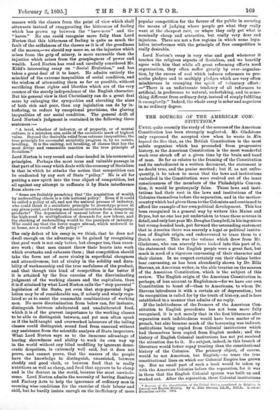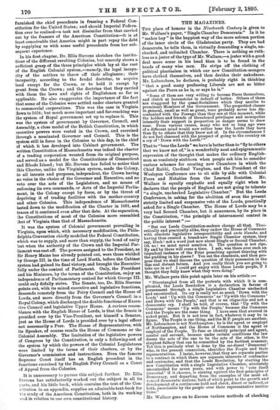THE SOURCES OF THE AMERICAN CON- STITUTION.* UNTIL quite recently
the study of the sources of the American Constitution has been strangely neglected. Mr. Gladstone only expressed the accepted view when he wrote in Kin beyond the Sea that, as the British Constitution is the most subtle organism which has proceeded from progressive history, so the American Constitution is the most wonderful work ever struck off at a given time by the brain and hand of man. So far as relates to the framing of the Constitution and its embodiment in a written document, the statement is no doubt true, and the praise merited ; but if, as not unfre- quently, it be taken to mean that the laws and institutions embodied in the Constitution were evolved out of the inner consciousness of the members of the Philadelphia Conven- tion, it would be grotesquely false. Those laws and insti- tutions had their root in the laws and institutions of the Colonies themselves before the separation, and in the mother- country which had given them to the Colonists and continued to afford the example of her own political development. This has been recognised in a general way by writers like Maine and Bryce, but no one has yet undertaken to trace these sources in detail, and only last year Mr. Douglas Campbell, in his ingenious but wrong-headed book, put forward the astounding statement that in America, there was scarcely a legal or political institu- tion of English origin, and endeavoured to trace them to a Dutch source. This was the volume which drew from Mr. Gladstone, who can scarcely have looked into this part of it, the statement that the English people were a great fact, but much in need of a vigorous canvassing of their character and their claims. In no respect certainly can their claims better bear canvassing, as has been abundantly shown by Dr. Ellis Stevens, an American writer, in the able treatise on the sources of the American Constitution, which is the subject of this review. The English origin of the American Constitution is, perhaps, of less account to Englishmen—for we have our own Constitution to boast of—than to Americans, to whom Dr. Stevens introduces it with a certain air of deprecation; but its recognition is called for by the truth of history, and is here established in a manner that admits of no reply.
If the indebtedness of the framers of the American Con- stitution to English precedents has not been more fully recognised, it is not merely that in the first bitterness after separation such indebtedness would have been matter of re- proach, but also because much of the borrowing was indirect, institutions being copied from Colonial institutions which had themselves been copied from English models; and the history of English Colonial institutions has not yet received the attention due to it. No subject, indeed, in this branch of literature would better repay treating than the constitutional history of the Colonies. The primary object, of course, would be not American, but English,—to trace the true constitutional lines on which our Colonial Empire has grown up. But no small part of such a book would be taken up with the American Colonies before the separation, for it was in them that the English Colonial system was built up and worked out. After the separation, these Colonial institutions • Sources of the Constitution of the United States, considered in Relation to Colonial and English. History. By 0. Ellis Stevens, LL.D., D.O.L. London: Macmillan and 0o. 1895. furnished the chief precedents in framing a Federal Con- stitution for the United States; and should Imperial Federa- tion ever be realised—a task not dissimilar from that carried out by the framers of the American Constitution—it is at least conceivable that America might in part repay the debt by supplying us with some useful precedents from her sub- sequent experience.
In his first chapter, Dr. Ellis Stevens sketches the institu- tions of the different revolting Colonies, but scarcely shows a sufficient grasp of the three principles which lay at the root of the English Colonial system,—namely, the legal incapa- city of the settlers to throw off their allegiance ; their incapacity, according to the feudal doctrine, to acquire land except for the Crown, or to hold it except by grant from the Crown ; and the doctrine that they carried with them the laws and rights of Englishmen so far as applicable. He also exaggerates the importance of the fact that some of the Colonies were settled under charters granted to commercial corporations. This was the case in Virginia down to 1624; but much more important and far-reaching was the system of Royal government set up to replace it. This was the system of government by Governor, Council, and Assembly, a close model of the British Constitution, in which executive powers were vested in the Crown, and exercised through a nominated Governor and Council. This is the system still in force in the Colonies to this day, in the chief A which it has developed into Cabinet government. The written Constitution of Massachusetts was indeed the charter A a trading corporation wrested from its original purpose, and served as a model for the Constitutions- of Connecticut and Rhode Island ; but Mr. Stevens has failed to notice that this Charter, unlike the Virginian system, made the Colony, to all intents and purposes, independent, the Crown having no voice in the choice of the Governor and Executive, and no veto over the acts of the Legislature, and no means of enforcing its own commands, or Acts of the Imperial Parlia- ment, in the Colony except by force, or by the threat of depriving it of trading facilities with the mother-country and other Colonies. This independence of Massachusetts lasted down to the modification of the Charter in 1691, and traces of it continued even after that date. At the separation, the Constitutions of most of the Colonies more resembled That of Virginia than that of Massachusetts.
It was the system of Colonial government prevailing in Virginia, upon which, with necessary modification, the Phila- delphia Convention chiefly modelled the Federal Constitution, which was to supply, and more than supply, the bond of unity lost when the authority of the Crown and the Imperial Par- liament was cast off. The powers assigned to the President, as Sir Henry Maine has already pointed out, were those wielded by George III. in the time of Lord North, before the Cabinet system had gained its final victory, and brought the Executive fully under the control of Parliament. Only, the President and his Ministers, by the terms of the Constitution, enjoy an independence of Parliamentary control for which George III. could only fitfully strive. The Senate, too, Dr. Ellis Stevens points out, with its mixed executive and legislative functions, descends remotely from the Privy Council and the House of Lords, and more directly from the Governor's Council in a Royal Colony, which discharged the double functions of Execu- tive Council and legislative -Upper House. A curious resem- blance with the English House of Lords, is that the Senate is presided over by the Vice-President, not himself a Senator, just as the House of Lords is presided over by a legal officer not necessarily a Peer. The House of Representatives, with its Speaker, of course recalls the House of Commons or the Colonial Assembly. The limitation of the legislative powers of Congress by the Constitution, is only a following-out of the system by which the powers of the Colonial Legislatures were limited by the terms of their charters, or by the Governor's commission and instructions. Even the famous Supreme Court itself has an English precedent in the functions exercised by the English Privy Council as a Court of Appeal from the Colonies.
It is unnecessary to pursue this subject further. Dr. Ellis Stevens has satisfactorily worked out the subject in all its parts, and his little book, which contains the text of the Con- stitution in an appendix, supplies an admirable text-book for the study of the American Constitution, both in its working :cud in relation to our own constitutional history.



































 Previous page
Previous page